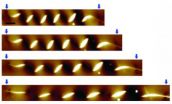(Press-News.org) A worldwide research consortium that includes the University of Oklahoma Health Sciences Center has proven that a new drug is more effective and easier to use than current medicines in the prevention of blood clots following hip replacement surgery.
The results reveal a better way to prevent the formation of blood clots in the deep veins of the legs – a condition known as deep vein thrombosis (DVT). The blood clots become life-threatening pulmonary embolisms (PE) when they break free and travel to the lungs.
Gary Raskob, Ph.D., an internationally recognized DVT expert and dean of the OU College of Public Health, was co-author and a co-director of the study, which appears as the lead article in this week's issue of The New England Journal of Medicine. The study compared the drug Apixaban, given orally twice a day, to the current standard medicine, Enoxaparin, given twice daily by injection under the skin.
The randomized, double-blind trial involved more than 5,000 patients and showed Apixaban reduced the risk of blood clots, without increasing bleeding side effects.
"Each year, about 750,000 Americans undergo hip or knee replacement surgery and that number is growing rapidly. This is a major stride forward as we work toward better prevention of life-threatening blood clots in these patients," Raskob said.
He added that the development of new oral anticoagulant agents, like Apixaban, has raised hope of a standard of care for DVT prevention that is as effective as or more effective than current standard approaches as well as being equally safe and more convenient for patients.
Raskob also was a primary author in another study published in the same issue of The New England Journal of Medicine focusing on the treatment of patients with established deep vein thrombosis.
"Despite the best current prevention efforts, blood clots still occur. So, it is important to continue to work toward better treatments as well as better ways to prevent blood clots," he said.
The second clinical trial, which included patients at the University of Oklahoma Health Sciences Center, found that the medication Rivaroxaban provided a simple, effective, single-drug approach for both short-term and continued long-term treatment of patients with deep vein thrombosis. Rivaroxaban is given orally in a fixed dose without the need for laboratory blood testing to monitor the anti-clotting effect. Current treatment methods, on the other hand, use two drugs, one given by injections under the skin once or twice a day for 5 to 10 days, followed by an oral medication that requires careful monitoring and dose adjustment based on results of regular blood tests.
"We are excited to have been able to participate in a study that is helping to advance the way we care for patients with deep vein thrombosis," said Suman Rathbun, M.D., a vascular medicine specialist at the OU Vascular Center. "Prevention is paramount, but we are not yet able to prevent 100 percent of these blood clots. So, it is important for us to continue to work toward new and improved treatments as well."
Scientists at OU and their colleagues worldwide are working diligently to find better and more practical tools to prevent and treat blood clots in the legs and lungs.
DVT affects at least 300,000 Americans each year. Most deep-vein blood clots occur in the lower leg or thigh. These blood clots can break off and travel through the bloodstream. When a clot travels to the lungs, the condition is called pulmonary embolism (PE), a serious condition that can cause damage to the lungs and death.
Researchers stress that while the results of the research released today are encouraging, the medications studied are not yet approved by the U.S. Food and Drug Administration.
INFORMATION:
The studies were funded by Bristol-Myers Squibb, Pfizer, Bayer Schering Pharma and Ortho-McNeil.
International research team reports major findings in prevention and treatment of blood clots
Breakthrough phase III clinical trial
2011-01-12
ELSE PRESS RELEASES FROM THIS DATE:
North America's environmental outlook: 9 topics to watch for 2011 and beyond
2011-01-12
Montreal, 11 January 2011—What is the future for North America's environment? Much of the answer is up to us.
A new report examines the major forces and underlying trends likely to shape the environment of North America in 2030 and outlines nine areas where decisions today will affect our environmental future in varying degrees.
In fact, while the pressures on North America's environment will continue to increase over the next 20 years, the report emphasizes that it would be a mistake to assume that our choices today can't influence environmental quality down the road.
North ...
Chemical analysis confirms discovery of oldest wine-making equipment ever found
2011-01-12
Analysis by a UCLA-led team of scientists has confirmed the discovery of the oldest complete wine production facility ever found, including grape seeds, withered grape vines, remains of pressed grapes, a rudimentary wine press, a clay vat apparently used for fermentation, wine-soaked potsherds, and even a cup and drinking bowl.
The facility, which dates back to roughly 4100 B.C. — 1,000 years before the earliest comparable find — was unearthed by a team of archaeologists from Armenia, the United States and Ireland in the same mysterious Armenian cave complex where an ...
NIDCR funding to US dental schools diminished from 2005 to 2009
2011-01-12
Adding to the national debate on the state of dental research in U.S. dental schools, an article released today titled "Total NIH Support to U.S. Dental Schools, 2005-2009", published in the International and American Associations for Dental Research's Journal of Dental Research, authors J.A. Lipton and D.F. Kinane conclude that the National Institute of Dental and Craniofacial Research (NIDCR) has played a diminishing role in funding research at U.S. dental schools between 2005 and 2009.
Utilizing the online NIH RePORT, comprehensive award data were obtained for U.S. ...
Poker-faced professions take toll on employees
2011-01-12
Employees who have to maintain a neutral disposition while they are on the clock tend to spend more energy to meet that requirement; therefore, they have less energy to devote to work tasks, according to new research from Rice University, the University of Toronto and Purdue University.
The researchers found that workers who must avoid appearing either overly positive or negative -- such as journalists, health care professionals, social workers, lawyers and law enforcement officers -- suppress expressions of emotion more than workers in other service-oriented professions, ...
Coiled nanowires may hold key to stretchable electronics
2011-01-12
Researchers at North Carolina State University have created the first coils of silicon nanowire on a substrate that can be stretched to more than double their original length, moving us closer to incorporating stretchable electronic devices into clothing, implantable health-monitoring devices, and a host of other applications.
"In order to create stretchable electronics, you need to put electronics on a stretchable substrate, but electronic materials themselves tend to be rigid and fragile," says Dr. Yong Zhu, one of the researchers who created the new nanowire coils ...
UBC researchers part of Planck satellite team that uncovers secrets of the universe
2011-01-12
University of British Columbia researchers are part of European Space Agency's Plank satellite mission that is revealing thousands of "exotic" astronomical objects, including extremely cold dust clouds, galaxies with powerful nuclei, and giant clusters of galaxies.
The international collaboration of scientists from 15 countries is presenting more than 25 scientific papers today in Paris, France, on the first results from the Planck mission. Launched in 2009, the Planck satellite is probing the entire sky at microwave wavelengths from 0.35 millimetre to one centimetre. ...
Gene helps plants use less water without biomass loss
2011-01-12
WEST LAFAYETTE, Ind. - Purdue University researchers have found a genetic mutation that allows a plant to better endure drought without losing biomass, a discovery that could reduce the amount of water required for growing plants and help plants survive and thrive in adverse conditions.
Plants can naturally control the opening and closing of stomata, pores that take in carbon dioxide and release water. During drought conditions, a plant might close its stomata to conserve water. By doing so, however, the plant also reduces the amount of carbon dioxide it can take in, ...
Inside a snowstorm: Scientists obtain close-up look at Old Man Winter
2011-01-12
In this winter of heavy snows--with more on the way this week--nature's bull's-eye might be Oswego, N.Y., and the nearby Tug Hill Plateau.
There the proximity of the Great Lakes whips wind and snow into high gear. Old Man Winter then blows across New York state, burying cities and towns in snowdrifts several feet high. This season, however, something is standing in his way.
The Doppler-on-Wheels (DOW), a data-collecting radar dish, is waiting. This month and next, scientists inside the DOW are tracking snowstorms in and around Oswego to learn what drives lake-effect ...
UCSD engineers give solar power a boost
2011-01-12
The growing popularity of solar photovoltaic (PV) systems across the United States has made it more important to maximize their power input. That's why UC San Diego environmental engineering professor Jan Kleissl is working on technologies and methods that will better predict how much power we can actually harness from the sun.
In a paper recently published in the journal Renewable Energy (http://www.sciencedirect.com/science/journal/09601481), "Optimum fixed orientations and benefits of tracking for capturing solar radiation in the continental United States," Kleissl ...
Researchers show environmental changes may affect vital cooperate bird behaviors
2011-01-12
New York, Jan. 11, 2011 -- While scientists believe that climate change and related extreme weather events such as drought and flooding will likely affect the earth's flora and fauna, just how much is not known. A new study by researchers Walter Jetz from Yale University and Dustin Rubenstein from Columbia University however shows an important link between the natural variation in climate conditions and complex behaviors among birds.
The study, which appears in print in Current Biology on Jan. 11, 2011, has implications for understanding how organisms may respond behaviorally ...
LAST 30 PRESS RELEASES:
A genetic brake that forms our muscles
CHEST announces first class of certified critical care advanced practice providers awarded CCAPP Designation
Jeonbuk National University researchers develop an innovative prussian-blue based electrode for effective and efficient cesium removal
Self-organization of cell-sized chiral rotating actin rings driven by a chiral myosin
Report: US history polarizes generations, but has potential to unite
Tiny bubbles, big breakthrough: Cracking cancer’s “fortress”
A biological material that becomes stronger when wet could replace plastics
Glacial feast: Seals caught closer to glaciers had fuller stomachs
Get the picture? High-tech, low-cost lens focuses on global consumer markets
Antimicrobial resistance in foodborne bacteria remains a public health concern in Europe
Safer batteries for storing energy at massive scale
How can you rescue a “kidnapped” robot? A new AI system helps the robot regain its sense of location in dynamic, ever-changing environments
Brainwaves of mothers and children synchronize when playing together – even in an acquired language
A holiday to better recovery
Cal Poly’s fifth Climate Solutions Now conference to take place Feb. 23-27
Mask-wearing during COVID-19 linked to reduced air pollution–triggered heart attack risk in Japan
Achieving cross-coupling reactions of fatty amide reduction radicals via iridium-photorelay catalysis and other strategies
Shorter may be sweeter: Study finds 15-second health ads can curb junk food cravings
Family relationships identified in Stone Age graves on Gotland
Effectiveness of exercise to ease osteoarthritis symptoms likely minimal and transient
Cost of copper must rise double to meet basic copper needs
A gel for wounds that won’t heal
Iron, carbon, and the art of toxic cleanup
Organic soil amendments work together to help sandy soils hold water longer, study finds
Hidden carbon in mangrove soils may play a larger role in climate regulation than previously thought
Weight-loss wonder pills prompt scrutiny of key ingredient
Nonprofit leader Diane Dodge to receive 2026 Penn Nursing Renfield Foundation Award for Global Women’s Health
Maternal smoking during pregnancy may be linked to higher blood pressure in children, NIH study finds
New Lund model aims to shorten the path to life-saving cell and gene therapies
Researchers create ultra-stretchable, liquid-repellent materials via laser ablation
[Press-News.org] International research team reports major findings in prevention and treatment of blood clotsBreakthrough phase III clinical trial



